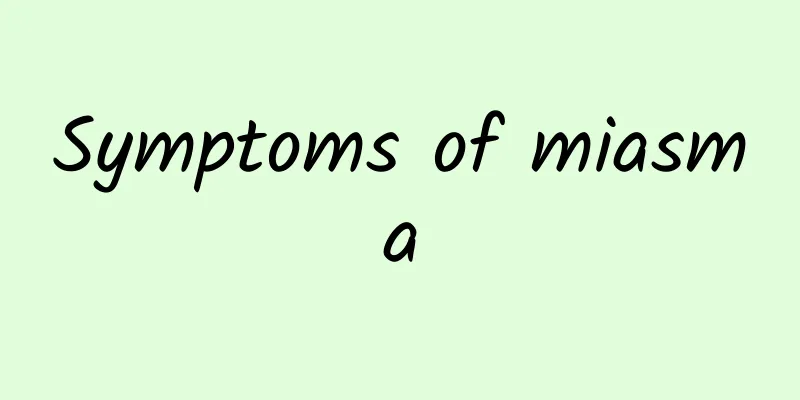Symptoms of miasma

|
We may have heard of miasma, but we don’t know what it is, whether it is a disease or a gas. But in southern my country or in tropical rainforest areas, everyone will understand what miasma means. Miasma is actually the gas produced by the decaying bodies of animals and plants. The northern part of my country has a temperate monsoon climate, while the southern part has a subtropical monsoon climate, so miasma is not common in my country. Miasma is a poisonous gas produced by the decay of animals and plants in tropical primeval forests. The main reason is that no one effectively handles the dead bodies of animals, and the high temperature in the tropics creates favorable conditions for the generation of miasma. "Miasma" is not necessarily "qi". Song Fangshao's "Bo Zhai Bian" records: "There was malaria in Longgang and Anyuan counties of Qianzhou (now Ganzhou, Jiangxi). The court rewarded them with generous salary increases, but the county officials were often vacant and not filled. Other officials who came to the county for their duties generally did not dare to stay, and some even went to the border to submit documents and send them away." Malaria in traditional Chinese medicine, Refers to the toxic gases in the southern mountains and forests that can cause human illness, mostly referring to the toxic gases produced by the decay of animals and plants in tropical primeval forests. Miasma was a common disease in the ancient Zhuang area. Guangxi has long been known as the "Malaria Town". As it was said in "Guihai Yuhengzhi": "Malaria is not found in Guilin in Guangdong and Guangxi. From there to the south, all places are miasma towns." Guangxi's hot, rainy and humid climate is the main cause of miasma. Zhuang doctors in the Song Dynasty not only had some understanding of the causes and pathogenesis of miasma, but also made a preliminary classification and used local prescriptions and medicines for treatment. The miasma mentioned by Zhuang medicine includes many diseases and does not refer to a specific disease. Therefore, "Lingwai Daida" says: "All diseases in the south are caused by Wei's miasma." Zhuang medicine divides miasma into green grass miasma, yellow plum miasma, new grass miasma, and yellow thatch miasma according to the season of onset; and divides it into cold miasma, hot miasma, and mute miasma according to the symptoms and nature. In the practice of fighting against miasma, Zhuang medicine has accumulated relatively rich experience. In addition to the fact that many Lingnan medicines for treating malaria were included in the herbal works of the Tang and Song dynasties, "Lingnan Health Prescriptions" recorded a large number of Lingnan people's experiences in treating malaria, and "Lingwai Daida" recorded the experience of using acupuncture therapy to treat hot malaria in the Zhuang area: "For southerners who have hot malaria for one or two days, they can prick their upper and lower lips with needles... If the malaria has lasted for more than a month and the disease has penetrated into the interior and the patient is on the verge of death, prick the patient's penis and the patient will be cured." Zhuang medicine's understanding and treatment of miasma enriched the content of traditional Chinese medicine. It can be said that it was in the leading position at that time. There are two types of attacks. One is tangible and the other is intangible. Tangible miasma is like clouds and thick fog. The invisible miasma, fishy wind or strange fragrance are all miasma. There is another kind. When it first appears, you can see a golden light in the jungle and bushes, and suddenly it falls from the sky. Some are as small as bullets and gradually dissipate, while others are as big as wheels and suddenly crack. It is neither a rainbow nor a cloud, but all colors fill the field, and the fragrance is overwhelming. People who are exposed to this smell will immediately become sick. This is called malaria and is the most terrible thing. In some places the miasma is so thick that in the early morning you cannot see each other even at a short distance. You have to wait until noon when the fog dissipates and the sun comes out before you can distinguish objects. It is especially bad in the mountains. Therefore, residents must eat a full meal or drink a few glasses of wine when they get up early in the morning and go out, so as to resist the miasma. Otherwise, they will get sick after being touched. It is very hot in summer and people sweat like rain, but residents dare not take off their clothes. They stay in the wind to cool down and go to bed at night with their doors and windows closed. This is to prevent the invasion of miasma. |
<<: What disease can cause numbness of lips?
>>: What are the main components of miasma?
Recommend
Anxious personality disorder
Everyone must have experienced anxiety, worrying ...
What are the effects of chrysanthemum tablets
Xiangju tablets are an over-the-counter medicine ...
Stomachache, stomach gurgling, what's going on?
Stomach pain is a very common phenomenon, which i...
Side effects of hyperthermic chemotherapy
Hyperthermia chemotherapy is a new type of treatm...
To nourish the kidneys, strengthen the spleen and remove dampness, eat a bowl of barley and red bean porridge every day
You can drink more barley and red bean porridge t...
Is hysteria hereditary?
Mental problems are becoming more and more common...
Causes of erythema annulare
Scars are a skin disease that almost everyone wil...
Why do you wake up at 2 or 3 o'clock in the night?
Sleep is very important to us, and everyone needs...
What causes otolith disease?
Otolith disease is also called otolith disease. T...
How long should I take Chinese medicine?
When we feel unwell or sick, we usually seek trea...
What causes chest tightness and shortness of breath after meals? How to treat it?
What is the reason for feeling chest tightness an...
The reasons why girls do not ovulate are often related to three diseases
Anovulation is the main reason why women cannot h...
Self-treatment of chondromalacia patella
In addition to being an important pillar supporti...
What causes numbness in the hands and feet? These three are the most common
In life, when people's bodies show numbness, ...
Can okra lower blood sugar?
As the elderly age, their metabolism slows down a...









